“Marketing is really just about sharing your passion.”
– Michael Hyatt

Whether out of necessity or for pleasure, everyone person makes purchases every day. That can mean taking a well-thought-out plunge to choose a mortgage or a car, absentmindedly clicking the link for a service provider, or impulsively adding a cute greeting card to a shopping cart. Whatever people buy and however they buy it, marketing professionals can help guide their choices. People in the marketing industry are passionate, outgoing, savvy, and strategic. They are able to use analytical thinking to get to the bottom of consumer behavior, and creative thinking to invent strategies that will guide that behavior.
More than simply advertising, marketing is about discovering a company’s message and delivering it to a target audience in an engaging way. Marketing can also mean managing an individual’s public image or helping businesses connect effectively with other businesses. The marketing field is big, with $190 billion spent in the US on advertising in 2016. And it’s rapidly evolving, with room for original thinking and new developments. That means an abundance of jobs in marketing with room for innovation and professional growth.
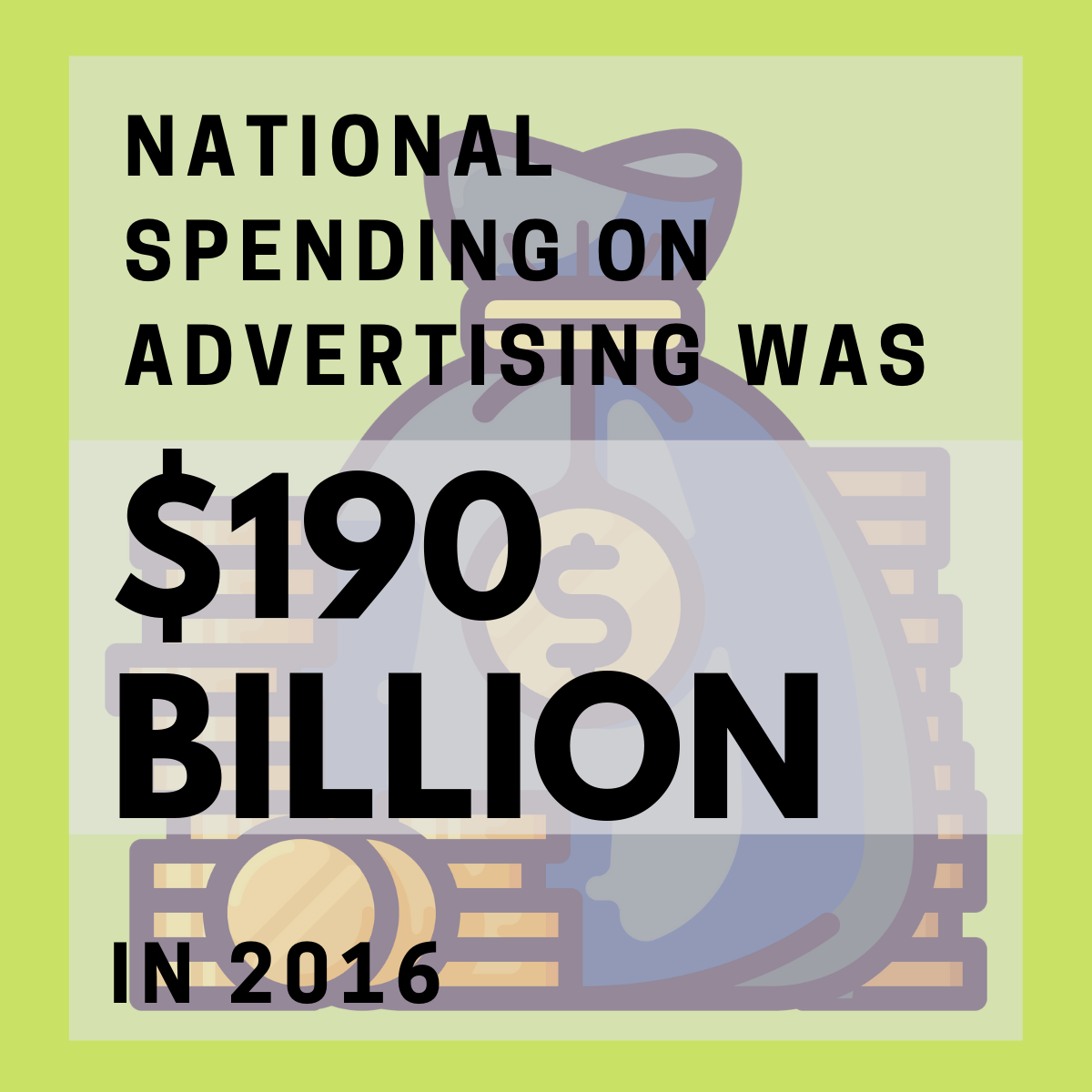
If you have the creative and strategic mindset for marketing, you’ll want to develop a solid skill set to back it up. You could achieve this with just a bachelor’s degree and on-the-job learning, and many people do. But a master’s degree- specifically, an MBA with a concentration in Marketing- can give you a serious edge in your career. This degree will provide you with a solid grasp of business fundamentals, along with specific skills related to marketing. With an MBA in Marketing, you’ll be eligible to high-level positions and able to affect real accomplishments, such as delivering messages through an all-new channel or re-branding a service.
Here, we’ll answer the question of “What Can I Do With a Marketing MBA?” We’ll cover the career path, potential employers, and salary expectations associated with this desirable degree. But before we get to that, we’ll answer the Marketing MBA basics: “What is a Marketing MBA?”, “How much does it cost to earn an MBA in Marketing?”, and “How long will it Take to Get a Marketing MBA?” Read on to learn the latest information, statistics, and industry advice on Marketing MBAs.
Featured Schools
What is an MBA in Marketing?
An MBA in Marketing refers to a Master’s of Business Administration (MBA) with a concentration in Marketing. An MBA is a multidisciplinary master’s degree that prepares graduates for a career in business, and traditionally takes two years to complete on a full-time basis. Core areas of study include business fundamentals like: Accounting, Finance, Microeconomics, Macroeconomics, and Management. Students pursuing a Marketing Concentration will build on this foundation with classes specific to marketing, like Consumer Trends and Branding. A Marketing MBA typically includes some experiential learning, like an internship, and ends with a capstone.
What Will I Learn in an MBA in Marketing Program?
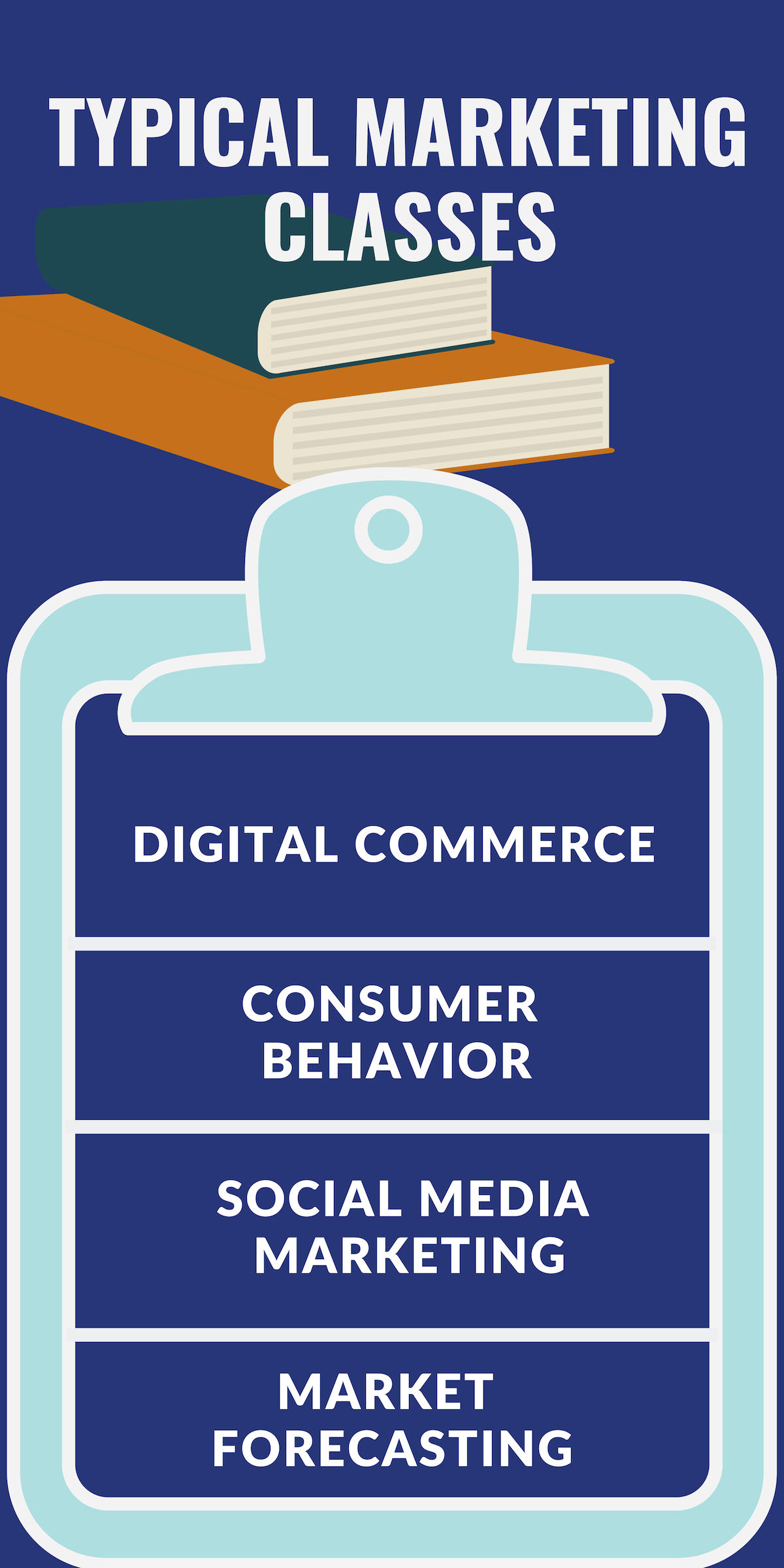
Your MBA will provide you with solid business skills, while your concentration in marketing will narrow in on skills in this field. You’ll learn through reading up on marketing principles, conducting case studies, completing projects, and hearing real-world insights from professors and guest lecturers with marketing backgrounds. Some of the courses you may complete in your marketing concentration include:
- Marketing Research
- Advertising Management
- Sales Force Management
- Marketing Channel Strategies
- Operations Management
- Branding
- International Marketing
- Product Development
- Forecasting and Modeling
- Digital Marketing
Beyond marketing courses, you may complete the following as part of your MBA in Marketing:
- Experiential Learning: These real-world learning experiences take place in a business or other organization, and require students to complete hands-on projects. Examples include internships, externships, and practicums.
- Capstone: This component comes in the final semester(s) of an MBA program, and is a culminating course designed to put together all the skills gained throughout the course of study. Examples include a capstone project, a thesis, or a seminar.
- Specialization: Marketing is already a concentration within an MBA program, but many schools allow students to further concentrate in a niche of the marketing field by taking topic-specific classes. Examples of marketing specializations include E-commerce, Luxury Marketing, Global Marketing, and Social Media Marketing.
It’s worth taking a moment to emphasize the importance of the internship component of an MBA in marketing. These work placement opportunities, which may be paid or unpaid, will play a real role in your professional future. Where you choose to work as an intern, and what you accomplish while there, will demonstrate your actual expertise to potential future employers in a way that your grades alone cannot. You will have the opportunity to gain supervision and experience from seasoned professionals, and may be able to connect with a personal mentor. Your internship associates will add to your professional network, and you may even be offered a job when your internship is completed.
What do I Need to Get into School for an MBA in Marketing?
An MBA is decidedly different than a regular master’s degree, with its exclusive focus on business, multidisciplinary studies, and hands-on approach to applied learning. It should come as no surprise that business school has a distinct set of application requirements, which you’ll need to follow in order to pursue your MBA in Marketing. These include:
- Bachelor’s degree
- GPA of 3.0 or higher
- GMAT score of 600 or higher
- 2+ years’ field experience
- Letter(s) of recommendation
- Resume and Personal Statement
It’s important to note that you can apply to business school even if you hold a bachelor’s in a field unrelated to business, such as political science or art history. In fact, some non-business majors would be especially relevant to the field of marketing, including communications, English, and psychology. If you’re considering an MBA in marketing and have previous field experience in the field of marketing, publicity, or sales, you’ll have a leg up in the admissions process.
How Long Does an MBA in Marketing Take?
Regardless of your concentration, an MBA usually takes two years to earn on a full-time basis. But if you’re in a hurry to complete your program and launch your career, you might want to consider an accelerated MBA program, which compresses the same curriculum into a shorter time frame (usually 18 months). If you’re still working on your bachelor’s degree, your school may offer an accelerated BA-to-MBA program, which compresses both degrees into a direct five-year program.
Many people pursuing an MBA, however, have existing careers and/or family obligations. These working professionals are typically looking to change careers or advance in their current roles, and need to fit their classes around existing schedules. For such “nontraditional students,” a part-time MBA program is the best fit, with classes usually taking place on nights, weekends, week-long intensives, or some combination of these. A part-time MBA usually takes 3-4 years to complete, depending on the number of classes taken per semester.
Can I Earn an MBA in Marketing Online?
It is not only possible to earn an MBA in marketing online, but a highly popular option, especially with nontraditional students. If you’re already holding down a job, especially one that requires travel, attending regular on-campus classes may not be an option. Online MBA classes usually deliver class content through a combination of on-demand content (like recorded lectures and posted texts) and live virtual meetings and collaborations. That means that online MBA students can complete much of their learning on their own schedule, whether that means using down time at the office or at odd hours in the evenings.
The curriculum for an online Marketing MBA is generally the same as that of a traditional on-campus program, with the same class titles and sequence. Your school will likely help you find an internship or practicum site, so you can gain the same real-world experience as a student attending a campus-based program would. As an online marketing MBA student, you and your classmates will usually progress through the program as a cohort, starting at the same time and graduating as a class. By learning as a cohort and working together on assignments, you’ll be able to develop a powerful peer network, which both on-campus and online marketing MBA graduates cite as an important asset in their post-graduation careers.
How Much Does an MBA in Marketing Cost?
What you’ll wind up paying for your MBA will depend mainly on which school you select. Private schools, especially old and prestigious schools, are more expensive, while public schools are cheaper, especially for in-state students. Taken as a whole, the average tuition for an MBA comes to $60,000 per year. Over the course of two years, you’d be looking at a total cost of $120,000, on average, to earn your Marketing MBA. In addition to this baseline, you’ll need to budget for textbooks, rent, your laptop, internet and all the other incidentals required of a full-time student.
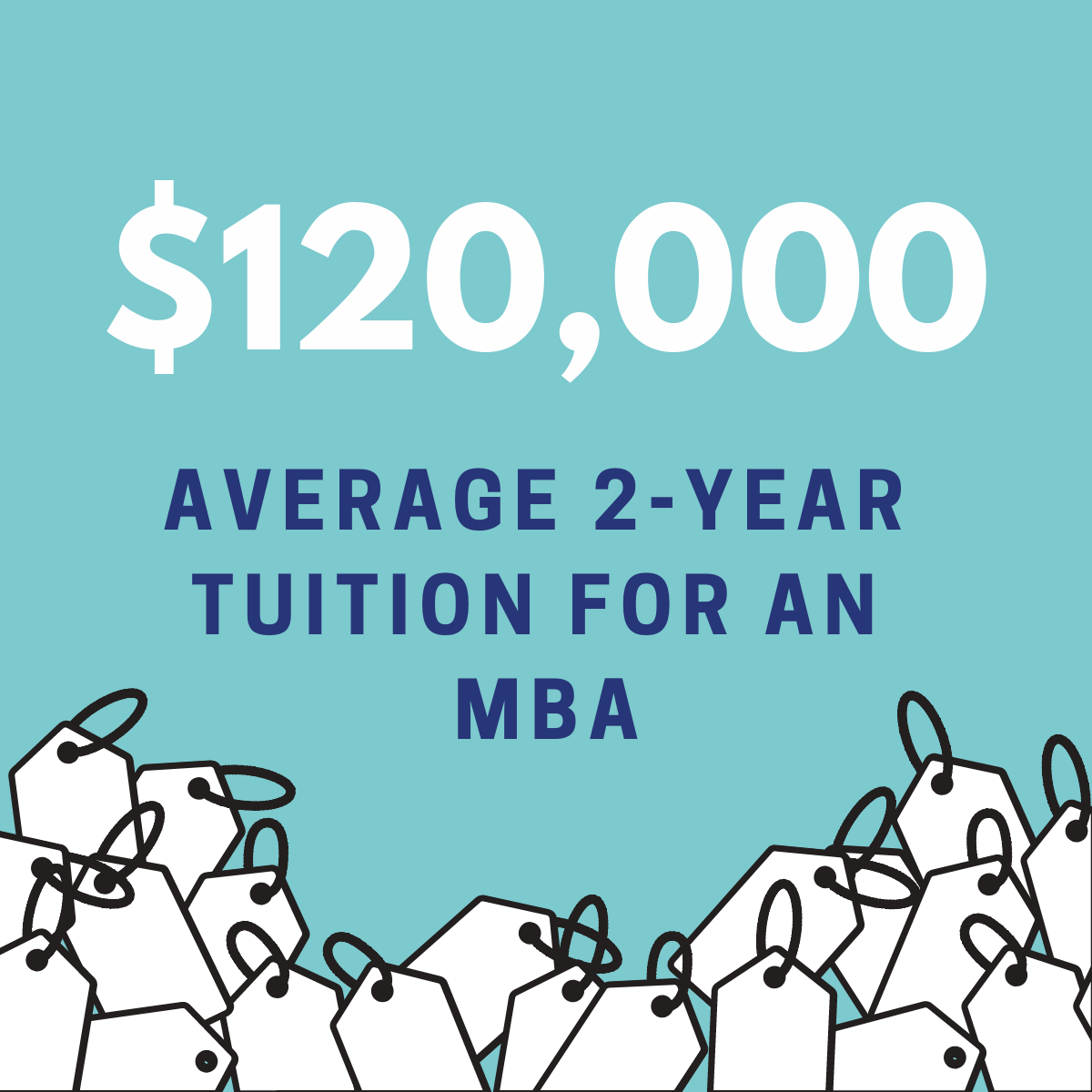
As U.S. News and World Report has pointed out, you do have several options when it comes to covering the cost of a marketing MBA. These include:
- Business school fellowships
- Grad school and external scholarships
- Teaching assistance positions
- Employer education sponsorship
- Federal and private student loans
Featured Schools
What is the Job Outlook with an MBA in Marketing?
The field of marketing is evolving quickly, mostly thanks to new technologies that have dramatically changed the way consumers (as well as government entities and businesses) make purchases. But the number and quality of available jobs for those with a marketing MBA is steadily growing. Let’s take a look at the employers and regions where these jobs can be found, and what are the overall employment trends.
Some of the industries and business areas that most often hire marketing professionals include:
- Consumer Packaged Goods (CPG)
- Technology
- Healthcare
- Luxury Products and Services
- Digital Media
- Entertainment
- Business Development
- Financial Services
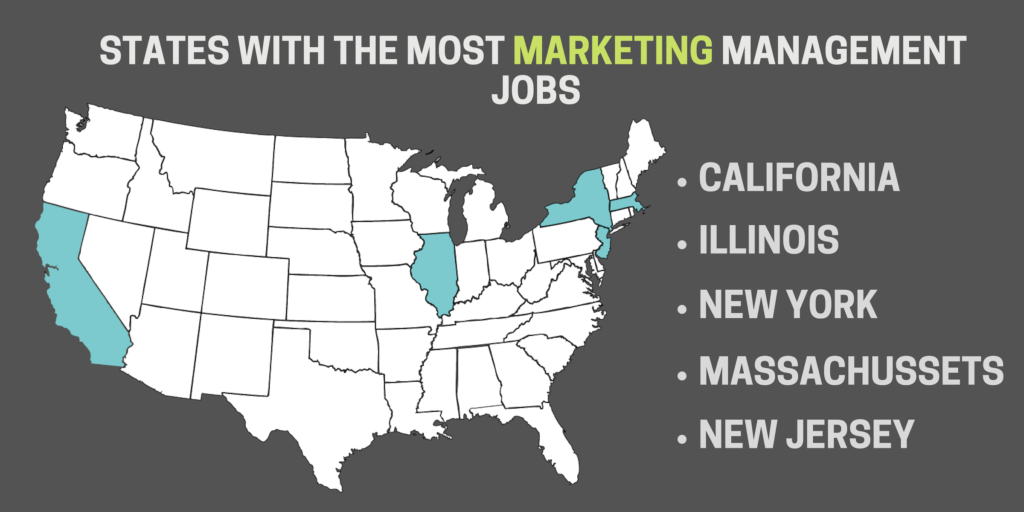
Not surprisingly, states with the largest commercial economies employ the greatest numbers of marketing managers are typically paid in big-economy states as well. Regionally, the Northeast and West Coast are great places to find a job in marketing management, but prosperous midwest states like Minnesota and Illinois are also excellent places to relocated if you hold an MBA in Marketing.
The Bureau of Labor Statistics (BLA) projects a robust job growth in the overall marketing industry, and finds that the growing field of digital commerce will ultimately mean an especially high demand in the field of market research analysis, as valuable consumer data becomes more widely available to companies to mine for insights. By looking at current trends, the BLS has made the following predictions in the number of job openings between 2016 and 2026:
- Public Relations Specialists: 9% projected job growth (as fast as average)
- Advertising, Promotions, and Marketing Managers: 10% projected job growth (faster than average)
- Market Research Analysts: 23% projected job growth (much faster than average)
What Jobs Can I Get with an MBA in Marketing?
One of the benefits of earning an MBA in Marketing, as opposed to a master’s in marketing, is that you’ll have a broad set of business skills under your belt. That translates to a broad range of professional options. With an MBA in Marketing, you can pursue a job in marketing, but you’ll also be qualified for a wide range of related jobs in business, such as general management and business administration.
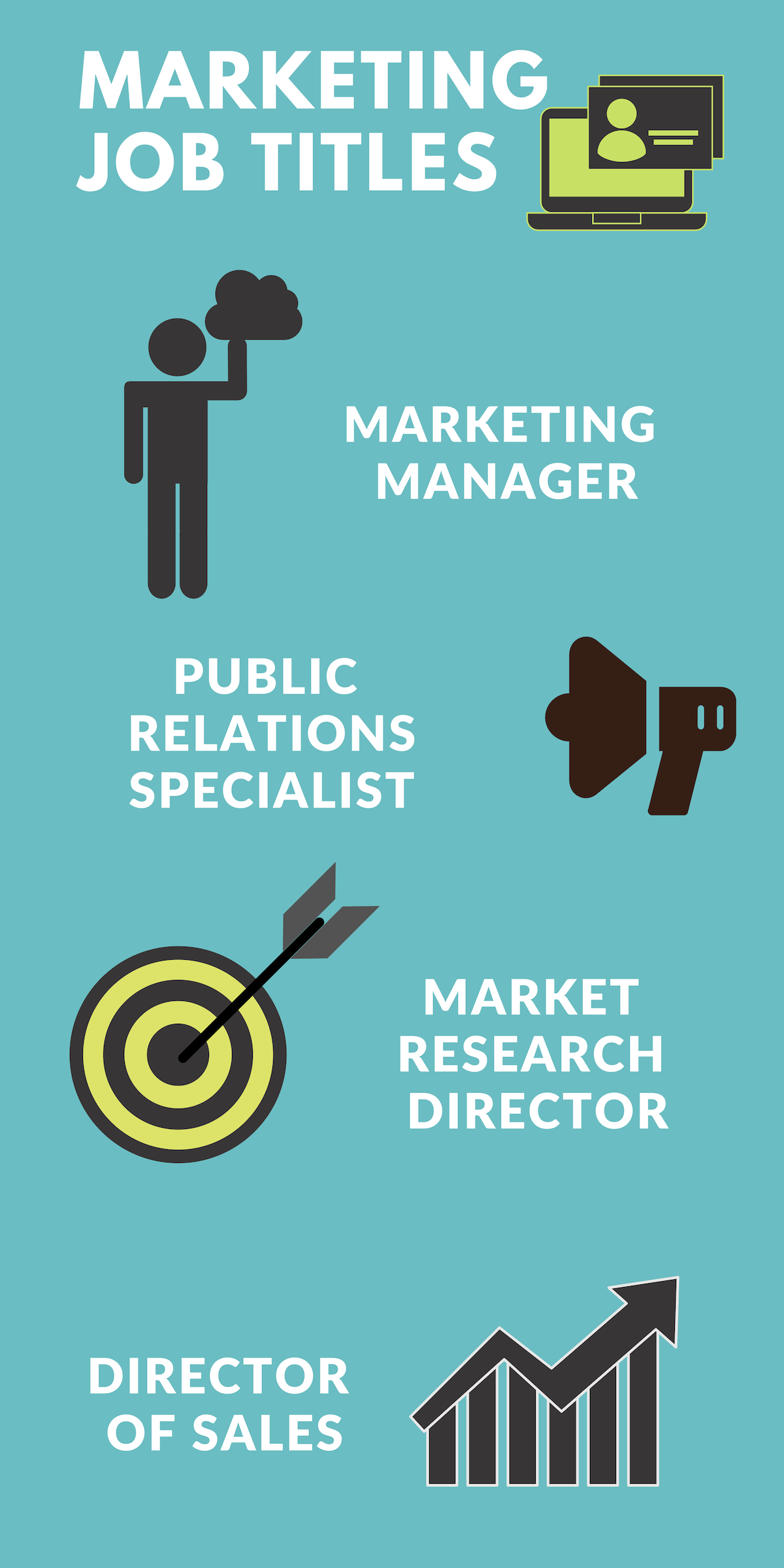
Jobs in marketing run the full gamut from technical jobs in consumer trend analysis to interpersonal jobs in advertising account management. Most positions in marketing require a blend of both analytical and interpersonal skills. Some of the most common positions associated with an MBA in Marketing include:
- Marketing Manager The role of marketing manager is one of the most commonly advertised positions for those with an MBA in marketing, and it’s easy to see why; this role involves the multidisciplinary skills in business, strategy, and communications that students learn in their degree program. A marketing manager’s main responsibility is to oversee all the communication between a company and its consumers, including its brand, public image, corporate values, and product promotions. In larger companies, the marketing manager may specialize in one area, such as social media imaging. This role is a good fit for well-rounded marketing professionals, with strength in both analytical and communication skills.
- Public Relations Specialist Also called a PR Specialist or publicist, a Public Relations Specialist is a professional who help public figures, like politicians, celebrities, and artists manage their image. In essence, instead of marketing a product or service, a PR specialist markets a person. That means building and maintaining their “personal brand,” developing and sharing their messages, and creating positive publicity. This position is a great fit for those with a marketing MBA who have outgoing personalities and powerful interpersonal and communication skills.
- Market Research Director Companies have always aimed to understands just who their customer base is and what they want to buy. Thanks to data gathering technology, companies have more information than ever about who’s buying and how, but rely on specialists to interpret this data and help them use it to craft a market strategy. Market Research Analyst was recently ranked 11th by Forbes in Best Business Jobs. This position is a good fit for those with a marketing MBA who are analytical thinkers with strong statistical skills.
- Director of Sales Sales is an area of commerce that overlaps with marketing. Whereas marketing is a lot about steering customer perceptions and decisions, sales is about securing transactions. This can involve consumer purchases or business to business transactions. With a marketing MBA, you will be qualified to lead a sales force and can bring consumer insights to your team’s sales strategy. This position is a good fit for those who have a strategic mindset, good decision-making, and leadership skills.
How Much Can I Earn with an MBA in Marketing?
Payscale reports that the average salary earned by those with an MBA in Marketing is an impressive $93,000 per year. Some of the most popular job titles posted on this site for a Marketing MBA were: Marketing Manager (average salary: $63,634), Marketing Director (average salary: $84,503), Product Marketing Director (average salary: $139,976), and Chief Marketing Officer ($169,761).

How much you can make depends mainly on your role and the size and location of your employer. Larger corporations tend to pay higher salaries, and to offer more generous bonuses and benefits. Top Marketing MBA employers, according to Payscale, include:
- Amazon.com Inc: $115,000 – $152,000
- General Electric Co (GE): $90,000 – $154,850
- Cognizant Technology Solutions Corp: $104,914
- Deloitte Consulting LLP: $172,000
- L’Oreal USA: $94,000
Geographic location matters, too. The states that pay out the highest salaries for marketing managers have robust economies, though some of those with the very biggest (like New York, California, and Texas) actually pay slightly lower salaries than some of their more modest counterparts, like Connecticut, Illinois, and New Jersey.
Marketing jobs have been increasing across the board, according to the American Marketing Association (AMA), but the industries with the greatest projected growth vary as well. The AMA lists the top industries for new marketing jobs in 2018-2019 as:
- Transportation: 14.5% growth
- Retail and Wholesale: 13.3% growth
- Consumer Packaged Goods: 6% growth
- Healthcare: 9.4% growth
MBA in Marketing Pros and Cons
We’ve looked at the facts about Marketing MBA degrees and associated jobs, including a number of points both in favor of and against earning they credential. To sum up, some of the key benefits of earning an MBA in Marketing are:
- High earning power in marketing
- Stimulating multidisciplinary work
- Robust job marketing market
- Powerful alumni and professor network
- MBA degree has wide applications
On the flip side, some of the difficulties and drawbacks associated with a marketing MBA are:
- High business school tuition
- Time commitment of 1-4 years
- Takes time and focus from current career
- Requires blend of analytical and interpersonal skill
Should I get an MBA in Marketing?
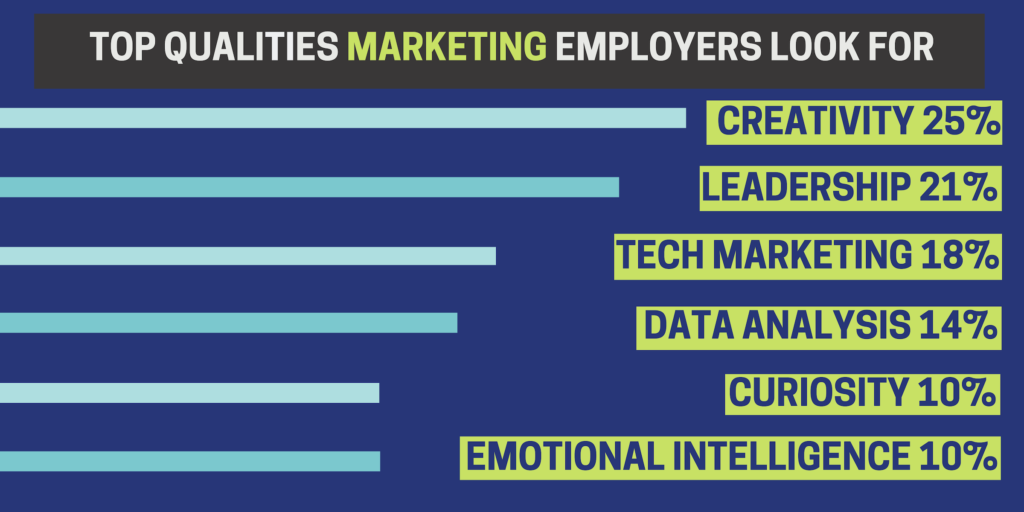
Is an MBA in Marketing a good fit for you? Much will depend on whether you can make the tuition and time commitment work for your life. The right fit will also depend on whether your personal strengths align with those that are in demand in marketing. According to a broad 2018 survey by the American Marketing Association, employers are looking for both technical skills (like facility with data science) and soft skills (like curiosity). Some jobs in marketing lean towards the analytical (such as market research) and some lean towards creative (think product development). But to rise to a leadership role in any field of marketing, you’ll need to have a solid grasp of both types of skill set. Ask yourself, “Am I naturally creative?”, “Am I comfortable leading teams?,” and “Can I make sound business decisions?” If you find the answer is yes, the field of marketing may be right for you.
An MBA in marketing can help you carve out a path to a high-ranking position within this field. An MBA in marketing is associated with a lucrative income and a stimulating career with plenty of room for growth. But perhaps more importantly, people like working in marketing. A survey of 230 people with an MBA in Marketing conducted by Payscale found that they rated their job as “extremely satisfying,” with a 5 out of 5 rating.